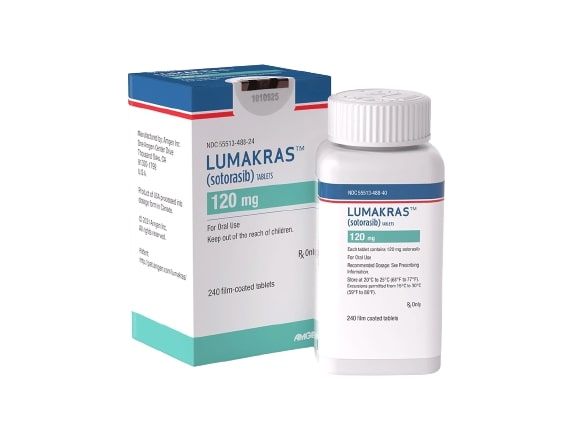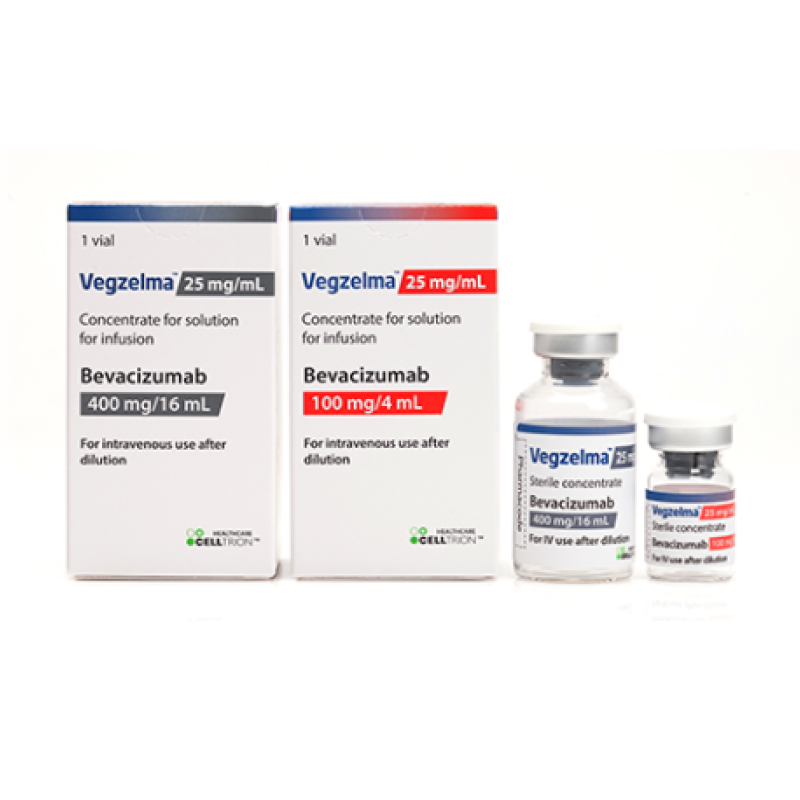Lumakras (sotorasib) vs Vegzelma (bevacizumab-adcd)
Lumakras (sotorasib) vs Vegzelma (bevacizumab-adcd)
Lumakras (sotorasib) is a targeted therapy specifically designed to inhibit the KRAS G12C mutation in non-small cell lung cancer (NSCLC), making it suitable for patients with this particular genetic alteration. On the other hand, Vegzelma (bevacizumab-adcd) is a biosimilar to Avastin (bevacizumab) and works by inhibiting vascular endothelial growth factor (VEGF), thereby preventing the growth of blood vessels that feed tumors, and is used in various types of cancer, including certain types of lung, kidney, cervical, and colorectal cancers. The choice between Lumakras and Vegzelma would depend on the patient's specific type of cancer, its molecular profile, and the treatment goals set by the healthcare provider.
Difference between Lumakras and Vegzelma
| Metric | Lumakras (sotorasib) | Vegzelma (bevacizumab-adcd) |
|---|---|---|
| Generic name | Sotorasib | Bevacizumab-adcd |
| Indications | Treatment of KRAS G12C-mutated NSCLC | Various types of cancer including metastatic colorectal cancer, non-squamous non-small cell lung cancer (NSCLC), glioblastoma, metastatic renal cell carcinoma, cervical cancer, and ovarian cancer |
| Mechanism of action | Inhibits KRAS G12C mutant protein | Monoclonal antibody that inhibits angiogenesis by binding to vascular endothelial growth factor (VEGF) |
| Brand names | Lumakras | Vegzelma |
| Administrative route | Oral | Intravenous |
| Side effects | Diarrhea, musculoskeletal pain, nausea, fatigue, liver damage | Hypertension, proteinuria, hemorrhage, gastrointestinal perforation, impaired wound healing |
| Contraindications | None known beyond hypersensitivity to sotorasib | Hypersensitivity to bevacizumab or its excipients, pregnancy |
| Drug class | Kinase inhibitor | Monoclonal antibody |
| Manufacturer | Amgen | Celltrion Healthcare |
Efficacy
Lumakras (sotorasib) for Lung Cancer
Lumakras (sotorasib) is a novel medication specifically designed to target the KRAS G12C mutation in non-small cell lung cancer (NSCLC). This mutation is present in approximately 13% of patients with NSCLC and has been historically challenging to target. The efficacy of Lumakras for the treatment of NSCLC was evaluated in a multicenter, single-arm, open-label clinical trial, which included patients with the KRAS G12C mutation who had received at least one prior systemic therapy. The primary endpoint was the objective response rate (ORR), and the results showed a significant ORR, indicating that Lumakras can shrink tumors effectively in a subset of patients with this specific genetic alteration.
Furthermore, the duration of response (DoR) observed in the trial was also noteworthy, with many patients experiencing a sustained response to the treatment. This suggests that Lumakras not only has the ability to induce tumor regression but also to maintain that response over time for some patients. It is important to note, however, that Lumakras is most effective in patients whose tumors harbor the KRAS G12C mutation, and it is not indicated for use in the broader lung cancer patient population without this specific genetic profile.
Vegzelma (bevacizumab-adcd) for Lung Cancer
Vegzelma (bevacizumab-adcd) is a biosimilar to the original bevacizumab product, which is a monoclonal antibody that inhibits vascular endothelial growth factor (VEGF). This mechanism of action is crucial in the treatment of various cancers, including non-small cell lung cancer, as it helps to prevent the growth of new blood vessels that tumors need to grow and metastasize. The efficacy of Vegzelma in lung cancer has been extrapolated from the original bevacizumab product, which has been extensively studied and shown to improve outcomes when used in combination with chemotherapy in patients with advanced or metastatic NSCLC.
In clinical trials of the reference product, bevacizumab, when added to chemotherapy, has been shown to improve overall survival and progression-free survival compared to chemotherapy alone. As a biosimilar, Vegzelma is expected to produce similar clinical outcomes in terms of efficacy and safety, provided that it is used in accordance with the approved indications. It is important for healthcare providers to follow the specific dosing and administration guidelines for Vegzelma to ensure optimal outcomes for patients with NSCLC.
Regulatory Agency Approvals
Lumakras
-
European Medical Agency (EMA), European Union

-
Food and Drug Administration (FDA), USA

-
Medicines & Healthcare products Regulatory Agency (MHRA), United Kingdom

Vegzelma
-
European Medical Agency (EMA), European Union

-
Food and Drug Administration (FDA), USA

Access Lumakras or Vegzelma today
If Lumakras or Vegzelma are not approved or available in your country (e.g. due to supply issues), you can access them via Everyone.org.
How it works

Make an enquiry
Choose the medicine you want to buy, answer a couple of questions, and upload your prescription to speed things up. We’ll get back to you within 24 hours.


Make an enquiry
Choose the medicine you want to buy, answer a couple of questions, and upload your prescription to speed things up. We’ll get back to you within 24 hours.


Breeze through the paperwork
We'll guide you through the required documents for importing unapproved medicine, ensuring you have all the necessary information.


Get a personalized quote
We’ll prepare a quote for you, including medicine costs and any shipping, administrative, or import fees that may apply.


Receive your medicine
Accept the quote and we’ll handle the rest - sourcing and safely delivering your medicine.

Some text on this page has been automatically generated. Speak to your physician before you start a new treatment or medication.
Let's talk
If you have any questions, call us or send us a message through WhatsApp or email:
Contact us




